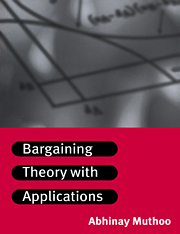7 - Procedures
Published online by Cambridge University Press: 24 November 2009
Summary
Introduction
The procedure of bargaining is the structure of moves of the bargaining process — it defines the rules of the bargaining game. The alternating-offers procedure — which underlies the models studied in Chapters 3–6 — is an example of a bargaining procedure. In Section 7.2 I describe (and evaluate) several alternative procedures of bargaining that differ from each other on the key procedural matter of ‘who makes offers and when’. A main message of this section is that this aspect of procedure — who makes offers and when — can have a significant impact on the bargaining outcome.
After an offer is accepted the proposer of that offer may have the option to retract the offer, in which case the players resume bargaining. This procedural feature is discussed in Section 7.3, where its impact on the bargaining outcome is studied through a modified version of the basic alternating-offers model. It is shown that this procedural feature may have a significant impact on the bargaining outcome. In particular, under some conditions, there exist subgame perfect equilibria that are Pareto inefficient.
While bargaining a player may have the option to temporarily close the channel of communication (and thus, to temporarily stop the bargaining process), which may impose costs on both players. For example, in the context of union-firm negotiations, the union has the option to go on strike. Such an action may be considered a tactical move, and interpreted as ‘burning money’.
- Type
- Chapter
- Information
- Bargaining Theory with Applications , pp. 187 - 210Publisher: Cambridge University PressPrint publication year: 1999



